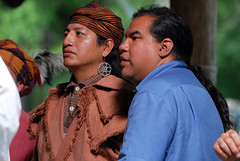adapted from As of Yet Untitled
Sunday evening I watched the first episode of We Shall Remain, a five part PBS series you can watch for free on their website. If you have 75 minutes to spare, don’t bother reading this review, just go watch After the Mayflower, the first episode, for yourself.
Contrary to its name, After the Mayflower starts slightly before the Pilgrims made landfall in Plymouth and provides a brief, but rich window into the way of life for the Wampanoag, the local Native American tribe near Plymouth, before the Pilgrims arrived. What was it like to be Wampanoag, the people of the first light, stretched out along the ocean, clearly aware of your place in the continent, welcoming the sun before all others? We also learn about the broad strokes of their political relationships with other local tribes as well as the plague that arrived just before the pilgrims killing 9 in 10 Wampanoag.
The documentary goes on to span the first 60 years of Native American and English relations, beginning with the first treaty between Massasoit, leader of the Wampanoag and ending with King Philip’s war, one of the bloodiest wars in North American history proportional to the population. It offers some challenging questions for pacifists. Especially Christian pacifists.
A few years ago when talking with a Caribbean friend about pacifism. What if refusing to use violence meant not just your death as an individual, but the death of your entire people and culture? He told me with the story of the Taínos, who were among the first to meet Colombus and welcomed him with gifts and open arms. For loving their enemy, they had the honor of being the first indigenous American culture to be made extinct by the Spanish through a combination of disease and having their hands cut off for not meeting gold quotas set by Columbus. Is this what Jesus had in mind?
The story in Massachusets Bay colony is more complex, but no less challenging to us as Christian pacifists. Massasoit’s decision to form an alliance with the Pilgrims was not simply the act of a noble man with good heart. It was a calculated political move driven by his people’s need for allies against rival tribes in the face of devastation by disease. The alliance was strengthened by cross-cultural relationship building and trade on both sides over the first few years. Both sides benefited from peace. So far, so Mennonite morality tale.
However, as the colonists grew in number, they became less reliant on the Wampanoag and more interested in their land. Their towns grew quickly with immigrants from England and they gradually pushed the Wampanoag into smaller and smaller pieces of land. Sound familiar? Its the process that settlers in the West bank are attempting to use on villagers in At-Tuwani today.
In 1660 the English began to establish "Praying Towns" which offered safety for natives in exchange for their conversion to Christianity and rejection of all of their traditional life ways. After the Mayflower includes excerpts from Tears of Repentence, a collection of testimonies that converts, known as "Praying Indians", gave in front of a panel of ministers in order to prove their sincerity. They reflect the effects of being told your whole culture and way of life is evil:
When they said the devil was my God, I was angry, because I was proud. I loved to pray to many Gods. Then going to your house, I more desired to hear of God… then I was angry with myself and loathed myself and thought God will not forgive my sins.
But After the Mayflower does not simply paint the Wampanoag as passive victims. In the figures of Massasoit and his son Metacom (or King Philip as the English knew him) we come to understand the difficult decisions these leaders made on behalf of and in consultation with their people. Would driving away the Pilgrims while they had the chance been the better option? What if they hadn’t loved their enemies?

Pingback: links roundup « HarvestBoston
This is remarkable.
So the Taino and the Wampanoag acted more like Christians than the invaders who called themselves Christians?!
The challenge is not on their side, I’d say.